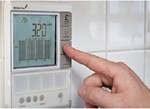With a mass roll-out of smart energy meters set for UK homes planned for 2014, a report has just been published which forecasts the market to topple £1 billion by 2015.
 Although some utility providers, such as British Gas and First: Utility have already started to deploy the smart meters, it’s not until 2014 that the devices will be rolled out en masse.
Although some utility providers, such as British Gas and First: Utility have already started to deploy the smart meters, it’s not until 2014 that the devices will be rolled out en masse.
IMS Research has also predicted that fitting in-home displays, also known as IHDs, will generate around £400 million in revenue over the next five years.
The deployment of smart meters to UK homes will also benefit other service providers, providing them with work, which is set to escalate as the initiative to employ full roll-out takes off.
“The UK has outlined a regulatory framework which includes the provision of in-home displays, which let consumers know how much electricity they are using; and can help manage and ideally reduce electricity consumption,” said Lisa Arrowsmith, a senior analyst at IMS Research.
She added that smart meters can improve energy management, as long as they are installed properly, and will also be able to help integrate renewable energy sources into the grid.
By 2020, smart meters will be fitted in every home, with around 53 million of the devices due to be rolled out by energy firms. With central heating and electricity costs continuing to escalate seemingly out of control, homeowners seem increasing open to implementing energy saving measures that will help them cut their energy bills.


